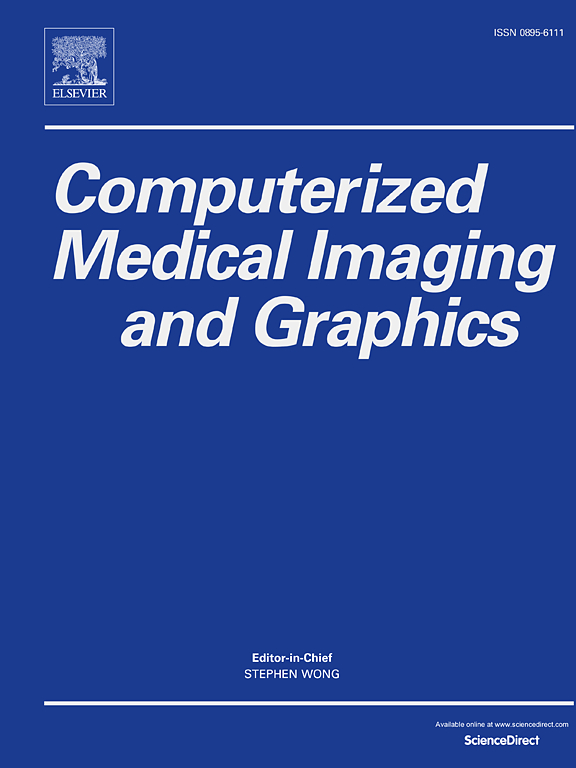Trustworthy AI for stage IV non-small cell lung cancer: Automatic segmentation and uncertainty quantification
IF 4.9
2区 医学
Q1 ENGINEERING, BIOMEDICAL
Computerized Medical Imaging and Graphics
Pub Date : 2025-05-13
DOI:10.1016/j.compmedimag.2025.102567
引用次数: 0
Abstract
Accurate segmentation of lung tumors is essential for advancing personalized medicine in non-small cell lung cancer (NSCLC). However, stage IV NSCLC presents significant challenges due to heterogeneous tumor morphology and the presence of associated conditions including infection, atelectasis and pleural effusion. The complexity of multicentric datasets further complicates robust segmentation across diverse clinical settings. In this study, we evaluate deep-learning-based approaches for automated segmentation of advanced-stage lung tumors using 3D architectures on 387 CT scans from the Deep-Lung-IV study. Through comprehensive experiments, we assess the impact of model design, HU windowing, and dataset size on delineation performance, providing practical guidelines for robust implementation. Additionally, we propose a confidence score using deep ensembles to quantify prediction uncertainty and automate the identification of complex cases that require further review. Our results demonstrate the potential of attention-based architectures and specific preprocessing strategies to improve segmentation quality in such a challenging clinical scenario, while emphasizing the importance of uncertainty estimation to build trustworthy AI systems in medical imaging. Code is available at: https://github.com/Sacha-Dedeken/SegStageIVNSCLC.
可信赖的AI用于IV期非小细胞肺癌:自动分割和不确定度量化
肺肿瘤的准确分割对于推进非小细胞肺癌(NSCLC)的个体化治疗至关重要。然而,由于肿瘤形态的异质性以及感染、肺不张和胸腔积液等相关疾病的存在,IV期NSCLC面临着巨大的挑战。多中心数据集的复杂性进一步复杂化了跨不同临床环境的稳健分割。在这项研究中,我们评估了基于深度学习的方法,利用来自Deep-Lung-IV研究的387个CT扫描的3D架构对晚期肺肿瘤进行自动分割。通过综合实验,我们评估了模型设计、HU窗口和数据集大小对描绘性能的影响,为鲁棒实现提供了实用指南。此外,我们提出了一个使用深度集成的置信度评分来量化预测的不确定性,并自动识别需要进一步审查的复杂情况。我们的研究结果证明了基于注意力的架构和特定的预处理策略在这种具有挑战性的临床场景中提高分割质量的潜力,同时强调了不确定性估计对于在医学成像中构建值得信赖的人工智能系统的重要性。代码可从https://github.com/Sacha-Dedeken/SegStageIVNSCLC获得。
本文章由计算机程序翻译,如有差异,请以英文原文为准。
求助全文
约1分钟内获得全文
求助全文
来源期刊
CiteScore
10.70
自引率
3.50%
发文量
71
审稿时长
26 days
期刊介绍:
The purpose of the journal Computerized Medical Imaging and Graphics is to act as a source for the exchange of research results concerning algorithmic advances, development, and application of digital imaging in disease detection, diagnosis, intervention, prevention, precision medicine, and population health. Included in the journal will be articles on novel computerized imaging or visualization techniques, including artificial intelligence and machine learning, augmented reality for surgical planning and guidance, big biomedical data visualization, computer-aided diagnosis, computerized-robotic surgery, image-guided therapy, imaging scanning and reconstruction, mobile and tele-imaging, radiomics, and imaging integration and modeling with other information relevant to digital health. The types of biomedical imaging include: magnetic resonance, computed tomography, ultrasound, nuclear medicine, X-ray, microwave, optical and multi-photon microscopy, video and sensory imaging, and the convergence of biomedical images with other non-imaging datasets.

 求助内容:
求助内容: 应助结果提醒方式:
应助结果提醒方式:


